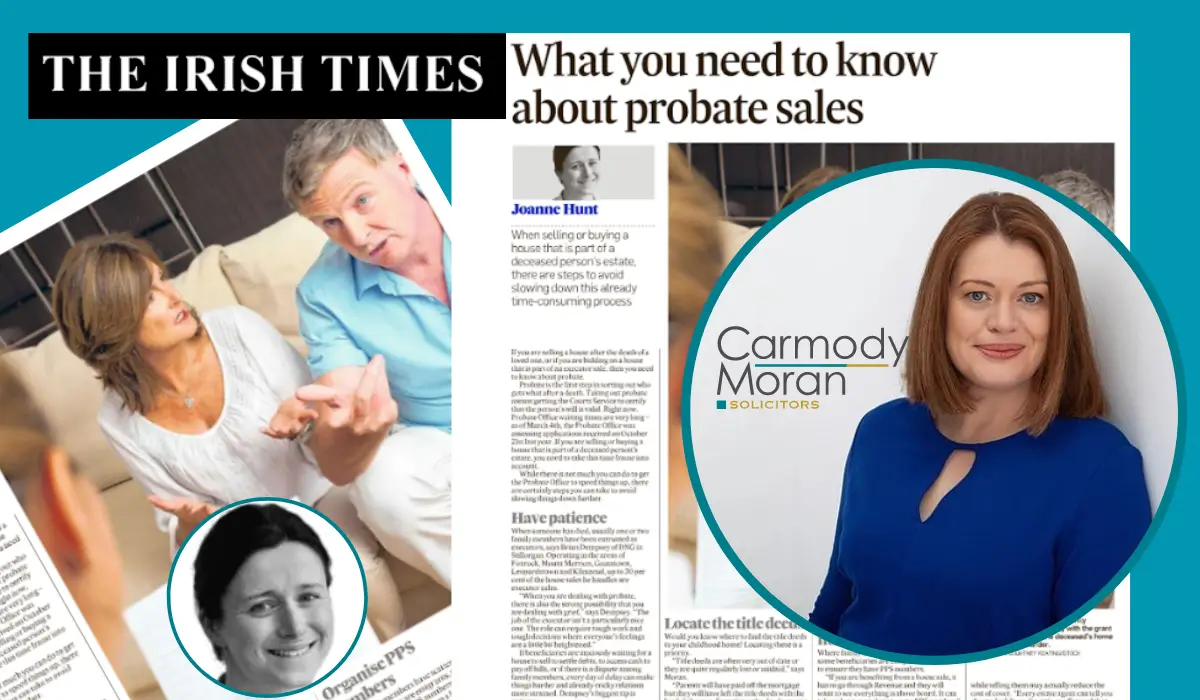What You Need to Know About Probate Sales: A Guide for Sellers and Buyers
Inheriting a house can be bittersweet. While it may hold sentimental value, selling it can be a complex process, especially when probate is involved. The legal process of administering a deceased individual’s estate is called Probate. This informative blog post, based on a recent Irish Times article by Joanne Hunt, dives into the world of probate sales and offers valuable insights for both sellers and buyers.
Our expert resource for this post is Niamh Moran, a solicitor from Carmody Moran Solicitors. Ms. Moran sheds light on the current state of probate in Ireland, highlighting the lengthy wait times – up to six months – which can be a source of stress for beneficiaries eager to sell a property.

Selling a House in Probate in Dublin
Challenges for Sellers:
The article explores the challenges faced by sellers navigating a probate sale. Here are some key takeaways:
Sellers: Patience is Key
Probate delays can be a source of stress for sellers eager to finalise the sale. Brian Dempsey, an estate agent with DNG, emphasises the importance of patience. He advises waiting for probate to be completed before listing the house. Rushing the process can heighten anxiety for beneficiaries and potentially slow things down further. Following your solicitor’s guidance is crucial, as they can advise on the optimal time to put the house on the market.
Preparation is Paramount
While you wait for probate, there are steps you can take to expedite the selling process once it’s complete. Solicitor Niamh Moran highlights the importance of preparation:
- Locate Title Deeds: Finding the title deeds is a priority. They can be outdated, lost, or misplaced. Start searching early, considering banks or closed solicitors’ offices where they might be stored. Reconstituting lost deeds is possible but time-consuming.
- Resolve Planning Issues: Building renovations done over the years may not comply with current planning regulations. Obtain an architect’s opinion on compliance or exemption to avoid delays during the sale.
- Gather Necessary Paperwork: Arrange a Building Energy Rating (BER) certificate and proof of local property tax compliance. Ensure all beneficiaries have PPS numbers, which are essential for tax purposes related to the sale.
- Organise the House: Clearing and decluttering the house can be emotionally challenging. Consider hiring a house clearance company to help with sorting and potentially donating unwanted items. Staging the house with some furniture might also be necessary.
- Maintain Insurance: If the deceased was the policyholder, inform the insurance company and update the policy with the executor’s information. Leaving the house unoccupied requires notifying the insurer as well, as it can affect coverage and cost.
Buying a House Going Through Probate
Tips for Buyers:
The article assures potential buyers that probate sales shouldn’t be a deterrent. Here’s what you should know:
- Don’t Be Discouraged: Probate sales can be excellent opportunities. However, inquiring about the probate status and being prepared for potential delays due to processing times is crucial.
- Ask Questions: Understanding the timeline and any outstanding issues related to the property is essential before making an offer.
Effective Communication is Essential
Clear communication between the executor and beneficiaries is key to a smooth process. Some beneficiaries might be under financial pressure to sell quickly, while others may have emotional attachments and prefer a slower pace. The executor doesn’t need beneficiary consent for the final decision but should consider their views. Keeping them informed, especially about final offers, helps avoid misunderstandings and delays.
Note
Probate sales in Ireland can be complex, but with careful planning and clear communication, both sellers and buyers can navigate the process successfully. By following the tips outlined in this blog, you can minimise stress and ensure a smoother experience. Remember, for a more in-depth exploration of probate sales and expert advice, refer to the original Irish Times article.
For a more in-depth exploration of probate sales and expert advice from Carmody Moran’s Solicitor Niamh Moran, we highly recommend reading the article by Joanne Hunt, a contributor to The Irish Times, writes about homes and property, lifestyle, and personal finance. See the full article in the Irish Times.
Contact Us About Probate Sales in Dublin or Ireland
If you or your family or relatives have questions regarding any of these matters, please telephone us on 018272888 for more information or email us at [email protected]. Our “Ask the Expert” consultations commence at €246 (including vat) and we can arrange to meet with you at Mount Street, Dublin 2, just off Merrion Square and Baggott Street, or at our centrally located office in Blanchardtown, Dublin 15, just off the M50 to chat through you requirements and options.

Niamh Moran is a partner at Carmody Moran Solicitors in Dublin. Niamh’s litigation experience includes injury claims law (both Plaintiff and Defendant) and is an Advisory Board Member of the State Claims Agency.